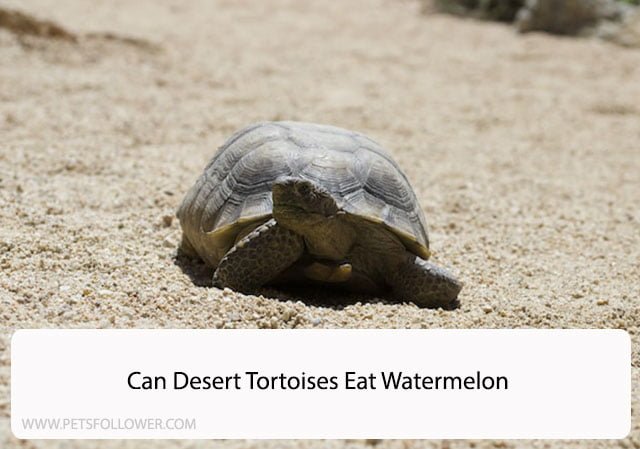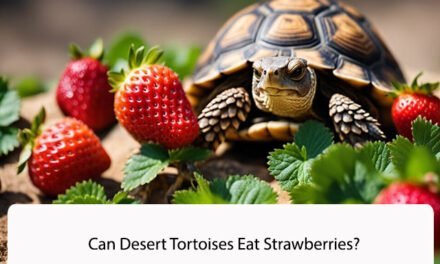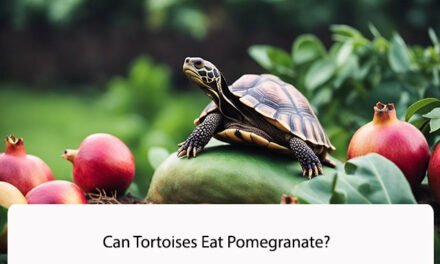Desert tortoises are fascinating creatures that have adapted to the harsh conditions of their natural habitat. As herbivores, they have a varied diet that includes grasses, flowers, and even cacti. However, many pet owners wonder if they can feed their tortoise fruits such as watermelon.
Watermelon is a delicious and refreshing fruit that is enjoyed by many people during the summer months. It is also a good source of vitamins and minerals, which makes it a healthy snack. But can desert tortoises eat watermelon? The answer is yes, but in moderation. While watermelon is not toxic to tortoises, it should not be a regular part of their diet due to its high sugar content.

Desert Tortoise Diet Basics
As responsible pet owners, it is important to know what our desert tortoises can and cannot eat. Feeding them the wrong foods can lead to health problems and even death. So, what should we be feeding our desert tortoises?
First and foremost, it is important to know that desert tortoises are herbivores, which means they only eat plants. Their diet should consist of a variety of grasses, wildflowers, leafy greens, and other vegetation that can be found in their natural habitat.
It is important to note that not all plants are safe for desert tortoises to eat. Some plants can be toxic and cause harm to our pets. It is essential to research and identify the plants that are safe for our desert tortoises to consume.
In addition to plants, desert tortoises also need access to fresh, clean water. They obtain most of their water from the plants they eat, but they still need a source of water to drink from. It is recommended to provide a shallow dish of water for them to drink from, and to change the water daily to prevent bacteria growth.
In summary, a desert tortoise’s diet should consist of a variety of safe plants and fresh water. As pet owners, it is our responsibility to research and provide a healthy and balanced diet for our pets.
Understanding Watermelon Nutrients
Watermelon is a refreshing and delicious fruit that is enjoyed by many. But, can desert tortoises eat watermelon? Before we answer that question, let’s take a closer look at the nutrients found in watermelon.
Watermelon is a good source of vitamins A and C, as well as potassium. It is also low in calories, making it a great snack for those watching their weight. In addition, watermelon contains small amounts of other vitamins and minerals, including calcium, iron, and magnesium.
One of the most important nutrients found in watermelon is lycopene. Lycopene is a powerful antioxidant that has been shown to have many health benefits. It is believed to help protect against certain types of cancer, as well as heart disease and other chronic conditions.
In addition to lycopene, watermelon also contains citrulline. Citrulline is an amino acid that has been shown to help lower blood pressure and improve blood flow. It is also believed to help improve athletic performance and reduce muscle soreness after exercise.
Overall, watermelon is a nutritious fruit that can provide many health benefits. However, as we will discuss in the next section, it is important to consider whether desert tortoises can safely eat watermelon.
Can Desert Tortoises Eat Watermelon?
Watermelon is a delicious fruit that many people enjoy during the summer months. It is also a popular treat for many pets, including dogs and cats. But can desert tortoises eat watermelon?
After conducting research and consulting with experts, we have found that watermelon can be safely consumed by desert tortoises in moderation. However, there are a few things to keep in mind before feeding watermelon to your tortoise.
Firstly, watermelon should only be given as an occasional treat and not as a regular part of their diet. This is because watermelon is high in sugar and can cause digestive issues if given in excess. Additionally, it is important to remove any seeds before feeding watermelon to your tortoise as they can be a choking hazard.
It is also important to note that watermelon should not replace a tortoise’s regular diet of hay, grasses, and leafy greens. These foods provide the necessary nutrients for a tortoise’s health and well-being.
In conclusion, while watermelon can be safely consumed by desert tortoises in moderation, it should not replace their regular diet. As with any new food, it is important to introduce watermelon slowly and monitor your tortoise for any adverse reactions.
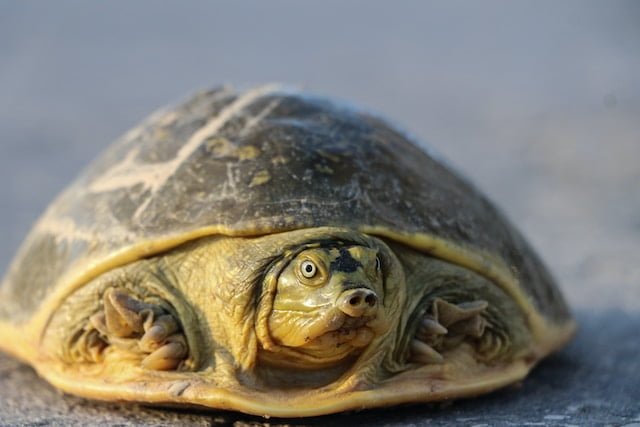
Effects of Watermelon on Desert Tortoises
Watermelon is a delicious fruit that many of us enjoy eating during the summer months. However, as desert tortoise owners, we may wonder if it is safe to feed our pets this fruit. In this section, we will discuss the effects of watermelon on desert tortoises.
Firstly, it is important to note that watermelon is not toxic to desert tortoises. In fact, it can be a healthy addition to their diet when given in moderation. Watermelon is high in water content, which can help keep your tortoise hydrated, especially during hot summer months. It is also a good source of vitamin C, which can help boost their immune system.
However, it is important to remember that watermelon should not be the main component of your tortoise’s diet. Desert tortoises require a diet that is high in fiber and low in protein and fat. Watermelon is high in sugar, which can lead to weight gain if given in excess. It is recommended to feed your tortoise watermelon as an occasional treat, rather than a regular part of their diet.
In conclusion, while watermelon is safe for desert tortoises to eat, it should be given in moderation as a treat. It can provide some health benefits, but should not replace the main components of their diet. As responsible tortoise owners, we should always ensure that our pets are receiving a balanced and healthy diet.
Proper Feeding Techniques
When it comes to feeding desert tortoises, it is important to follow some proper techniques to ensure their health and well-being. Here are some guidelines to keep in mind:
- Offer a balanced diet: Desert tortoises are herbivores and need a balanced diet that includes a variety of fruits, vegetables, and grasses. Watermelon can be a great addition to their diet, but it should not be the only food they eat.
- Cut the watermelon into small pieces: Tortoises have small mouths and can’t bite off large pieces of food. Cut the watermelon into small, bite-sized pieces to make it easier for them to eat.
- Remove the seeds: Watermelon seeds can be a choking hazard for tortoises. Make sure to remove all the seeds before feeding them the watermelon.
- Offer water: Watermelon has a high water content, but it is still important to offer fresh water to your tortoise. Make sure they have access to clean water at all times.
- Feed in moderation: While watermelon can be a healthy treat for tortoises, it should be fed in moderation. Too much fruit can cause digestive problems and lead to obesity.
By following these proper feeding techniques, you can ensure that your desert tortoise is getting a balanced diet and staying healthy.
Alternative Fruits for Desert Tortoises
As we mentioned earlier, watermelon can be a great treat for desert tortoises, but it should not be the only fruit they consume. In fact, it’s important to vary their diet with different fruits to ensure they get all the necessary nutrients.
Here are some alternative fruits that can be fed to desert tortoises:
- Papaya: This fruit is high in vitamin A and fiber, which are both important for tortoise health. It’s also a good source of potassium and vitamin C.
- Mango: Mangoes are rich in vitamin C, which helps boost the immune system. They also contain vitamin A and beta-carotene, which are important for vision and skin health.
- Strawberries: Strawberries are a great source of vitamin C and fiber. They also contain antioxidants, which help protect against cell damage.
- Blueberries: Blueberries are another fruit that’s high in antioxidants. They’re also a good source of vitamin C and fiber.
- Grapes: Grapes are a good source of vitamin C and potassium. They also contain antioxidants and fiber.
It’s important to note that these fruits should be fed in moderation and should not make up the majority of a tortoise’s diet. They should be given as treats and supplements to their regular diet of grasses and vegetables.
Overall, providing a variety of fruits to your desert tortoise can help ensure they get all the necessary nutrients for a healthy and happy life.
Conclusion
Based on our research, we have found that desert tortoises can eat watermelon as part of their diet. However, it is important to note that watermelon should not be the main source of food for desert tortoises, and should only be given in moderation.
Watermelon contains high amounts of water and sugar, which can be beneficial for desert tortoises, especially during hot weather when they need to stay hydrated. However, too much watermelon can lead to diarrhea and other digestive problems.
It is recommended to feed desert tortoises a balanced diet that includes a variety of vegetables, fruits, and grasses. Watermelon can be given as an occasional treat, but should not make up more than 10% of their diet.
Overall, while desert tortoises can eat watermelon, it should be given in moderation and as part of a balanced diet. As with any food, it is important to monitor their intake and make sure they are not experiencing any negative side effects.
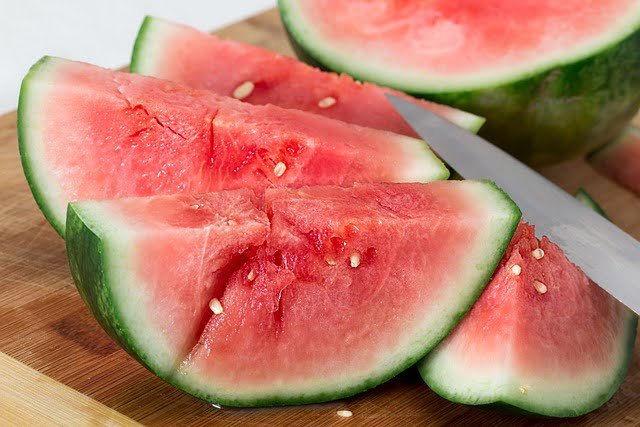
Frequently Asked Questions
What fruits are safe for tortoises to eat?
Tortoises can safely eat a variety of fruits, including apples, bananas, berries, and melons. However, it’s important to remember that fruits should only make up a small portion of a tortoise’s diet, as they are high in sugar.
Is watermelon safe for Hermann tortoises?
Yes, Hermann tortoises can eat watermelon in moderation. However, it’s important to remove the seeds and only offer the flesh of the fruit.
Can red footed tortoises eat watermelon rind?
While red footed tortoises can technically eat watermelon rind, it’s not recommended. The rind is tough and difficult for them to digest, and it doesn’t provide much nutritional value.
Can honeydew melon be part of a tortoise’s diet?
Yes, honeydew melon can be part of a tortoise’s diet, but it should be given in moderation. Like other fruits, it’s high in sugar and should only make up a small portion of the tortoise’s overall diet.
Is watermelon safe for marginated tortoises?
Yes, marginated tortoises can eat watermelon in moderation. As with Hermann tortoises, it’s important to remove the seeds and only offer the flesh of the fruit.
Can Russian tortoises safely eat watermelon rind?
No, it’s not recommended to feed Russian tortoises watermelon rind. The rind is tough and difficult for them to digest, and it doesn’t provide much nutritional value. It’s best to stick to offering the flesh of the fruit only.

